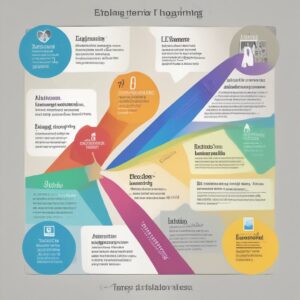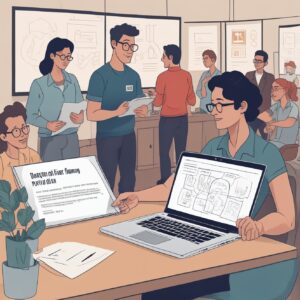
In today’s fast-paced world, the pursuit of knowledge is crucial for staying relevant. Whether for personal or professional reasons, continuous learning opens doors to new opportunities. One of the best ways to ensure consistent growth is by embracing personalized learning strategies that align with your unique needs, preferences, and goals.
At the V-Confluence meeting on September 6, 2024, we were honored to host Sir Victor Martins Onuoha, a seasoned software engineer with over 10 years of experience in both Germany and Nigeria. As a full-stack developer, Sir Victor shared invaluable insights into the core principles of effective learning and its importance for success in the modern world.
However, effective learning goes beyond merely understanding new concepts—there are strategic ways to enhance your learning process, ensuring that you absorb, retain, and apply information efficiently.
In this article, we will explore powerful effective learning strategies that will empower your growth, both personally and professionally.
10 STRATEGIES FOR EFFECTIVE LEARNING
Join a Community for Support and Motivation

Learning doesn’t have to be a solo journey. Joining a learning community or peer group can provide the support, motivation, and perspective needed to stay on track. Whether it’s a formal group like an online course forum, or an informal gathering of peers with similar interests, a community creates a space for shared knowledge.
By discussing concepts with others, you gain new insights and viewpoints that might not have been obvious during independent study. Moreover, learning within a group fosters accountability. When others depend on your input or expect updates on your progress, it becomes easier to stay consistent.
For example, if you’re learning a programming language, joining a local tech meetup or online coding group can provide guidance and feedback. Members of the group can share their experiences, offer solutions to your challenges, and even collaborate on projects, giving you a more practical understanding of the subject.
Know Your Learning Style for Optimal Growth

Everyone learns differently, and understanding your learning style is crucial for effective learning. Some people absorb information best through visual methods (like charts and videos), while others may be more comfortable with auditory learning (like lectures and podcasts).
Learning styles can be broadly categorized into:
- Visual learners: People who learn best by seeing. They prefer diagrams, graphs, and illustrations.
- Auditory learners: People who learn through listening. Audiobooks, podcasts, and verbal instructions suit them.
- Kinesthetic learners: People who learn by doing. They excel in hands-on activities, like workshops, physical models, and practical applications.
- Reading/writing learners: People who learn through reading and taking notes.
Identifying your learning style early on will save you time and energy. For instance, if you’re a kinesthetic learner trying to memorize facts from a textbook, it might take longer compared to if you tried applying the information in a real-world scenario.
To find your learning style, reflect on past learning experiences. Did you find visual aids more helpful? Do you retain information better when you discuss it out loud? Once you pinpoint the method that works best for you, you can optimize your learning process.
Focus on Personal Interests to Sustain Motivation

We all know how difficult it is to stay engaged when learning a topic we find uninteresting. One of the best ways to foster deep learning is to prioritize subjects that align with your personal interests and passions.
When you learn something that genuinely excites you, it becomes easier to stay motivated, and the learning process feels less like a chore. For example, if you’re fascinated by graphic design, learning about color theory and typography will feel like a rewarding experience rather than just another task. Over time, your natural curiosity will drive you to seek more information, deepening your understanding.
It’s important to note that focusing on your interests doesn’t mean you should avoid difficult topics. In fact, challenging yourself in areas that align with your passions can result in significant growth. If you love technology but find coding difficult, your passion for tech will help you push through and master coding.
Embrace Continuous Learning for Long-Term Success

The world is constantly evolving, and industries change rapidly. Whether it’s the advent of new technologies or shifts in market demand, staying ahead of these changes requires continuous learning.
Continuous learning is the practice of constantly acquiring new skills and knowledge throughout your life. It’s about making learning a habit rather than a short-term goal. This is particularly important in fields like technology, healthcare, or marketing, where developments occur frequently. For example, a digital marketer who stays up to date with the latest SEO practices or social media algorithms will have an edge over competitors.
To embrace continuous learning, dedicate time to regular study or professional development. Attend webinars, read industry journals, take online courses, or participate in workshops. By doing so, you’re not only enhancing your current skill set but also preparing yourself for future opportunities.
Dedicate Time for Learning Consistently

Consistency is key to mastering any new skill. To make significant progress in your learning, it’s essential to allocate regular, focused time for study. Whether it’s daily or weekly, having a set learning schedule ensures that you build momentum.
Time-blocking is an effective method to achieve this. By setting aside specific time slots for learning, you eliminate distractions and create an environment conducive to concentration. You don’t need hours at a stretch— even 30 minutes of focused learning per day can accumulate to a significant amount of knowledge over time.
For example, if you’re working a full-time job and trying to learn a new skill like digital marketing, you can dedicate 30 minutes every evening to study. This way, you’ll make steady progress without overwhelming yourself.
Showcase Your Skills to Reinforce Learning

Once you’ve learned something new, it’s important to put it into practice. Showcasing your skills by working on real-world projects, collaborating with friends, or even presenting your work to a global audience can reinforce your learning and build confidence.
Building a portfolio is a great way to demonstrate your skills and track your progress. Whether you’re learning graphic design, coding, or writing, creating a portfolio of your work allows you to reflect on how far you’ve come while also giving you something to showcase to potential employers or collaborators.
If you’re learning a technical skill like web development, collaborate with friends or local businesses to build websites. Similarly, if you’re improving your writing skills, start a blog or contribute guest articles to well-known publications. Not only will you enhance your learning, but you’ll also gain credibility and opportunities within your field.
Stay Dedicated to Your Learning Goals

Dedication is the foundation of successful learning. Without commitment, it’s easy to give up when faced with challenges. To stay dedicated, define clear learning goals, set deadlines, and celebrate small wins along the way.
One strategy to maintain dedication is by breaking your larger goals into smaller, manageable tasks. For example, if your goal is to learn Python programming, break it down into smaller sub-goals, such as understanding basic syntax, mastering loops and functions, and then working on a project. Each accomplishment will boost your confidence and keep you motivated.
Accountability partners can also help maintain dedication. Share your learning goals with a trusted friend or mentor who can check in on your progress and offer encouragement when needed.
Consistency Is Key to Mastery

Consistency is often underestimated, but it’s one of the most powerful tools for effective learning. Creating a regular routine not only builds discipline but also strengthens the brain’s ability to retain information.
Neuroscience research shows that consistent repetition helps to reinforce neural pathways, making it easier to recall information and skills. This is why daily practice is often recommended for mastering a new language, musical instrument, or coding language. The more often you engage with a subject, the more familiar it becomes, making future learning faster and more efficient.
Building Personal Skills for Holistic Growth

Learning isn’t just about acquiring professional skills; it’s also about personal growth. Building personal skills such as emotional intelligence, communication, and time management can greatly enhance your ability to succeed in all areas of life.
For example, strong communication skills allow you to articulate your ideas clearly and effectively, which can be beneficial in both personal relationships and professional settings. Similarly, developing emotional intelligence helps you navigate interpersonal challenges and fosters better teamwork.
Incorporating personal development into your learning routine ensures that you grow holistically, creating a balance between hard and soft skills.
Feedback from Ajuka Foundation
Here’s what participants from the Ajuka Foundation had to say about how these effective learning strategies have impacted their growth:
Emenike Precious: emphasized the importance of peer groups and investing extra time to develop technical skills. He highlighted that focusing on personal interests maintains motivation, and showcasing skills by collaborating with friends helps reinforce learning. Continuous learning, he says, is essential for staying updated in a fast-evolving industry.
Ivory Irtwange: discussed the value of following industry leaders on social media to stay inspired and informed. She stressed dedicating specific days for learning, joining communities for enhanced growth, and embracing continuous learning for long-term success.
Bakare Mariam: reaffirmed that joining a peer group, investing in personal interests, and collaborating with others are essential for mastering new skills. She noted that continuous learning helps keep pace with industry changes.
Bridget Enaife: shared her views on independent learning, stating that it’s vital to understand one’s learning style and find a community that fosters growth, especially in technical fields.
Omogaga Anna: recommended starting small and showcasing skills to family and friends before building momentum through collaboration.
Daniel Martins: emphasized optimizing learning approaches by identifying one’s learning style and creating a portfolio to showcase skills.

Insightful